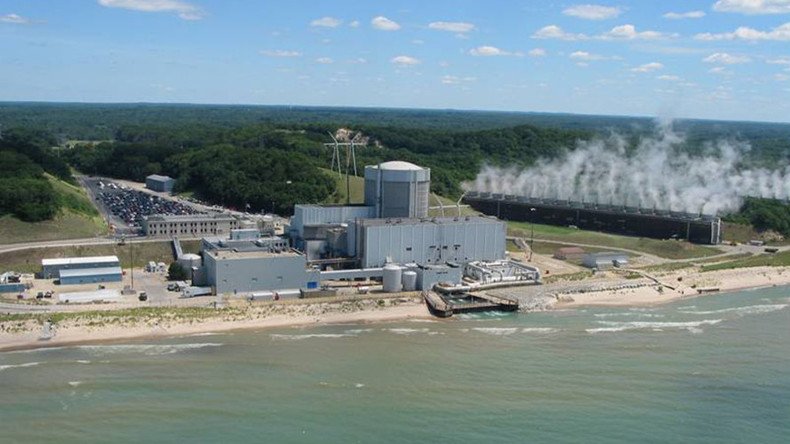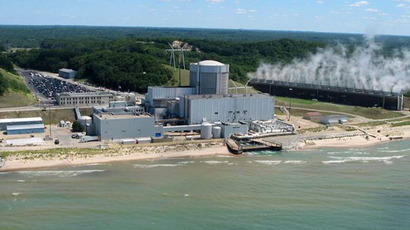‘Radioactive Russian roulette’: Lake Michigan NPP stays open amid public health concerns

Entergy Corp will keep open its Michigan nuclear plant through to 2022, reversing a decommission plan. Dubbed the “most dangerous atomic reactor in the US,” by activists its continuing operation raises the specter of risks to public health and the environment.
“Entergy will continue to make all necessary investments and maintain appropriate staffing, in accordance with strict licensing standards,” said Charlie Arnone, Entergy’s top official at the plant, in a statement on Thursday.
Entergy said it remains committed, however, to its strategy to exit the merchant nuclear power business.
The decision comes after Michigan regulators cut $36 million out of Consumer Energy’s proposal to buy out the remainder of its nuclear power purchase agreement (PPA) with Entergy. The companies requested more than $172 million, but were approved for $136 million last week.
Entergy is delaying the closure of the Palisades nuclear power plant in southwestern Michigan. https://t.co/MF51PKbvXY
— WOOD TV8 (@WOODTV) September 28, 2017
The agreement broke down on how much customers would save if the plant shut down. When Entergy proposed closing the plant early, it and Consumer Consumer Energy estimated the PPA could save consumers $172 million over four years.
Last week, the Michigan Public Service Commission (PSC) calculated the amount differently.
“The commission determined that there would be savings to customers if that contract were terminated and replaced with other sources of power, but not the full amount that was requested by Consumer Energy,” said PSC Chairman Sally Talberg, according to MLive.
Palisades has a license by the Nuclear Regulatory Commission to operate through March 24, 2031. The 45-year-old plant is one of the country’s oldest nuclear power facilities and has been under elevated scrutiny from federal regulators in recent years, with numerous unplanned shutdowns due to problems.
Southeast Michigan #nuclear plant is back online after a 33-day outage for refueling and maintenance https://t.co/eID0I1k4qgpic.twitter.com/mbruYkoB2A
— Midwest Energy News (@MWenergynews) April 24, 2017
Calling it “radioactive Russian roulette on the Great Lakes,” anti-nuclear activists are concerned about the age-degraded atomic reactor.
“The hostage takers demanded a ransom for ratepayers. MPSC did not agree to the full amount demanded. So the hostage takers have refused to release the hostages,”said Kevin Kamps, Radioactive Waste Specialist at Maryland-based Beyond Nuclear.
“Given the stake for public health, safety and the environment, Consumers and Entergy are holding residents of the region downwind and downstream hostage to the increasing risk of a meltdown and catastrophic release of hazardous radioactivity.”
Entergy and Consumers announced last December they would shut the plant, replacing the generation with a mix of gas, renewables and energy efficiency. With the closure of five other nuclear plants around the US, Palisades is feeling the pressure to convert.
Illinois and New York approved subsidies to nuclear generators last year, aiming to preserve the carbon-free generation and jobs. Operators are currently pushing for similar deals in Pennsylvania and Connecticut, threatening to shut down plants in those states if supports are not approved, according to Utility Dive.
The Palisades plant employs about 600 workers and has been part of the Van Buren County community since it began generating electricity in 1971. The plant generates about 811 megawatts of virtually carbon-free electricity, enough to power more than 800,000 homes, according to Entergy.
Before announcing the delay closure, Entergy had been preparing for the decommissioning process, which can take up to 60 years and involves long-term storage of spent nuclear fuel and removing radioactive materials from the site.












